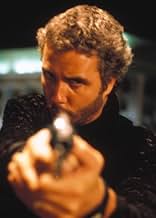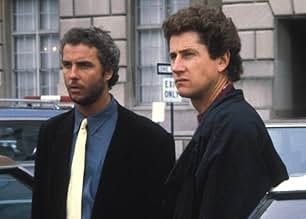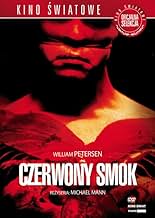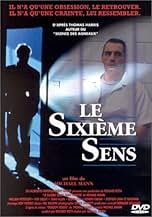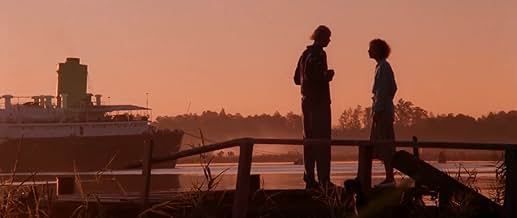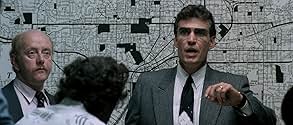L'analista dell'FBI Will Graham ritorna al lavoro per catturare un serial killer che stermina intere famiglie.L'analista dell'FBI Will Graham ritorna al lavoro per catturare un serial killer che stermina intere famiglie.L'analista dell'FBI Will Graham ritorna al lavoro per catturare un serial killer che stermina intere famiglie.
- Premi
- 1 vittoria e 1 candidatura in totale
Dan Butler
- Jimmy Price
- (as Dan E. Butler)
Alexandra Neil
- Eileen
- (as Alex Neil)
Recensioni in evidenza
Having finally seen MANHUNTER, I am left wondering why anyone ever felt the need to remake it - RED DRAGON is a fine flick, with a fine cast, but it feels exceptionally pale given what a tremendous source it was drawing from; scene for scene, line for line at some points.
So much threat, such a pervading sense of menace; the character work, and the direction, the wonderful soundtrack - it hums along, and there's no place to stop to catch your breath. I really adored this, and if you're looking for a really engrossing thriller, and I mean thriller, this movie delivers.
So much threat, such a pervading sense of menace; the character work, and the direction, the wonderful soundtrack - it hums along, and there's no place to stop to catch your breath. I really adored this, and if you're looking for a really engrossing thriller, and I mean thriller, this movie delivers.
I'm starting to think that I may be one of the only people who saw this film when it was originally theatrically released! Years after that, as a freshman in college, I was managing a video store when a woman came in looking for the recently released `Silence of the Lambs.' She said she knew William Petersen from childhood and told me that he was in THE first Hannibal the Cannibal movie. Having not read the novel or seen the movie for a while, I never related the two before that. But I specifically remembered `Manhunter' for its creepy killer, spectacular use of Iron Butterfly, and the strange & frightening notion (for then) of FBI profiling. These three details alone speak volumes for the film's acting, style and writing. The irony of forcing oneself to share the same maniacal thoughts as a killer in order to catch them is the stuff of nightmares. Since reconnecting with `Manhunter' back then, I've remained a constant fan of the film.
But the film suffers today in several ways. First off, any comparison to `Silence of the Lambs' is going to come up short. `Silence' is simply a better film a classic of the highest caliber that will continue to sustain itself with the passage of time. Those already acquainted with Jonathan Demme's world will probably have a hard time accepting `Manhunter.' But audiences should judge the film on its own merits, and recognize that unlike `Red Dragon' it was not designed to resemble an established world of a classic movie which is both a curse and an advantage for both films. I recently saw `Red Dragon,' by the way, and loved it. Walking out, I found myself asking whether I liked it better than `Manhunter.' These comparisons can get very silly because not only am I basing my impressions on a book, but also a previously filmed version and a closely related `sequel.' Best method: let each stand alone, THEN decide if either was successful. Both films succeed for similar and different reasons.
The approach of `Manhunter' is much more cold and observational than `Red Dragon.' This style (often concerned with widely symmetrical composition), like Kubrick's, can greatly benefit the story if used properly. I really liked it here. The neatness and sterility of the 80s décor also works perfectly in this format, providing a nice contrast to the horrors sometimes contained within its walls.
As for the music, it has not aged well. The synthesized stuff in the first hour is effective at times (especially when it's just a single, sustained note a la John Carpenter, or those bits that sound like `Blade Runner'), and the inclusion of In-a-Gadda-da-Vida is inspired, but the electronic balladry during Dolarhyde's romance is simply awful and detract from the scenes. Obviously, the danger of using such modern music is that it can become outdated and cheesy very quick. Is it just me, or does this especially seem true of 80s music? Given Michael Mann's career, he clearly wouldn't agree. I guess one never knows. The Tangerine Dream score for `Risky Business' or Phillip Glass' for `Thin Blue Line,' for example, still hold up remarkably well from this period.
The performances, however, are still wonderful. Petersen (whom I've heard didn't like the job he did) reaches just the right blend of seeming haunted, detached, morose, and as Dolarhyde describes him, purposeful. Dennis Farina, himself a former Chicago cop, exudes realistic authority as Jack Crawford. Tom Noonan obtains a disturbing childlike innocence and deliberation in his terror. And Brian Cox poor guy, will always be compared to Anthony Hopkins. It's unfair because he gives us a Lecter that is different, to be sure, but intelligent in a way that, to me, is more realistic, intriguing and ultimately frightening. Hopkins' Hannibal is so supremely horrible that he's practically supernatural at this point, not unlike Dracula or the Wolfman. I enjoy all of that too, but just on a different level.
8/10
But the film suffers today in several ways. First off, any comparison to `Silence of the Lambs' is going to come up short. `Silence' is simply a better film a classic of the highest caliber that will continue to sustain itself with the passage of time. Those already acquainted with Jonathan Demme's world will probably have a hard time accepting `Manhunter.' But audiences should judge the film on its own merits, and recognize that unlike `Red Dragon' it was not designed to resemble an established world of a classic movie which is both a curse and an advantage for both films. I recently saw `Red Dragon,' by the way, and loved it. Walking out, I found myself asking whether I liked it better than `Manhunter.' These comparisons can get very silly because not only am I basing my impressions on a book, but also a previously filmed version and a closely related `sequel.' Best method: let each stand alone, THEN decide if either was successful. Both films succeed for similar and different reasons.
The approach of `Manhunter' is much more cold and observational than `Red Dragon.' This style (often concerned with widely symmetrical composition), like Kubrick's, can greatly benefit the story if used properly. I really liked it here. The neatness and sterility of the 80s décor also works perfectly in this format, providing a nice contrast to the horrors sometimes contained within its walls.
As for the music, it has not aged well. The synthesized stuff in the first hour is effective at times (especially when it's just a single, sustained note a la John Carpenter, or those bits that sound like `Blade Runner'), and the inclusion of In-a-Gadda-da-Vida is inspired, but the electronic balladry during Dolarhyde's romance is simply awful and detract from the scenes. Obviously, the danger of using such modern music is that it can become outdated and cheesy very quick. Is it just me, or does this especially seem true of 80s music? Given Michael Mann's career, he clearly wouldn't agree. I guess one never knows. The Tangerine Dream score for `Risky Business' or Phillip Glass' for `Thin Blue Line,' for example, still hold up remarkably well from this period.
The performances, however, are still wonderful. Petersen (whom I've heard didn't like the job he did) reaches just the right blend of seeming haunted, detached, morose, and as Dolarhyde describes him, purposeful. Dennis Farina, himself a former Chicago cop, exudes realistic authority as Jack Crawford. Tom Noonan obtains a disturbing childlike innocence and deliberation in his terror. And Brian Cox poor guy, will always be compared to Anthony Hopkins. It's unfair because he gives us a Lecter that is different, to be sure, but intelligent in a way that, to me, is more realistic, intriguing and ultimately frightening. Hopkins' Hannibal is so supremely horrible that he's practically supernatural at this point, not unlike Dracula or the Wolfman. I enjoy all of that too, but just on a different level.
8/10
Dull and mundane title for such a fine film. I had some problem with the third victim in that the discrepancies between that and meticulously worked out modus operandi of the killer from earlier atrocities seemed glaring, never mind where he was likely to be on this night of the full moon. But never mind, the film is scary, very worrying and stunningly designed and shot with a decent central performance from William Petersen. He seems laid back and almost carefree but this is inevitable alongside the frightening performances of his past and present nemesis. The former is holed up in a terrifyingly all white cell and the latter lurking largely and taunting freely. Even though I had reservations about the final scenes these are very well executed and though I remembered little from my video viewing many years ago, that hand running through the tiger's fur was clearly burned into my subconscious. Great!
I have a problem with a lot of people's review of "Manhunter". Every single bad review that criticizes Cox or Noonan invariably mentions the movie "Red Dragon" in the same breath. How about being a little objective?
On its own as the original Hannibal Lecter movie, Manhunter is a good movie. Cox plays Lecter convincingly, and you can read from other reviewers who praised his work shows that with a little objectivity we can see an alternative representation of Lecter. It is true, as one other reviewer says, Hopkins acts Lecter, Cox *IS* Lecter. Cox never seems to be acting, he really plays the part with mystery and ambiguity not like the distinctly maniacal Lecter that Hopkins portrays.
Cox plays a true psychopath - one devoid of feelings, and yet a consummate actor. Some of the world's best actors are in fact psychopaths. A psychopath is not necessarily a killer - a psychopath is simply someone who does not feel for other human beings, which is often why the psychopath killers of this world were in fact convincing actors - for example Geoffrey Dahmer and Charles Manson.
So when we analyze the profiles of true psychopathic serial killers, we can quite clearly see that Cox plays the better Lecter than Hopkins. We can see Cox is devoid of compassion, and yet acts like a normal person. Hopkins on the other hand, never passes the creepy stage - he is too creepy and doesn't have the "acting" ability of a true psychopath to mask that image from the public eye. Cox shows that he could blend into normality without being caught.
And therein lies the problem with the negative reviews. We read countless negative reviews of this movie bemoaning the fact that Cox is not as creepy as Hopkins - but my dears, that is exactly why Cox plays the better Lecter!
On its own as the original Hannibal Lecter movie, Manhunter is a good movie. Cox plays Lecter convincingly, and you can read from other reviewers who praised his work shows that with a little objectivity we can see an alternative representation of Lecter. It is true, as one other reviewer says, Hopkins acts Lecter, Cox *IS* Lecter. Cox never seems to be acting, he really plays the part with mystery and ambiguity not like the distinctly maniacal Lecter that Hopkins portrays.
Cox plays a true psychopath - one devoid of feelings, and yet a consummate actor. Some of the world's best actors are in fact psychopaths. A psychopath is not necessarily a killer - a psychopath is simply someone who does not feel for other human beings, which is often why the psychopath killers of this world were in fact convincing actors - for example Geoffrey Dahmer and Charles Manson.
So when we analyze the profiles of true psychopathic serial killers, we can quite clearly see that Cox plays the better Lecter than Hopkins. We can see Cox is devoid of compassion, and yet acts like a normal person. Hopkins on the other hand, never passes the creepy stage - he is too creepy and doesn't have the "acting" ability of a true psychopath to mask that image from the public eye. Cox shows that he could blend into normality without being caught.
And therein lies the problem with the negative reviews. We read countless negative reviews of this movie bemoaning the fact that Cox is not as creepy as Hopkins - but my dears, that is exactly why Cox plays the better Lecter!
As I watched Manhunter the first time I kept thinking something about it seemed familiar. From the credits I discovered it was from Red Dragon by Thomas Harris, a book I had read.
William Peterson plays the enigmatic FBI agent Will Graham, who has left the job after almost being killed by Hannibal Lechter, but who is now coaxed back to help catch a killer who is murdering whole families in different locations in the United States.
I enjoyed Brian Cox as Lechter. He displays the "normal" quality of Lechter which allowed him to go undetected for so long before being arrested and receiving the moniker, "Hannibal the Cannibal". Perhaps because I saw Manhunter before Silence of the Lambs, I prefer Cox to Anthony Hopkins in the role.
The Freddy Lounds character is the stereotypical reporter you love to hate. He's in Graham's face and as obnoxious as they come. You almost root for something bad to happen to him.
Tom Noonan is delightful as the quiet Francis Dolarhyde. He's the loner that no one notices. I pitied him, then I feared him.
I recommend this film for those who enjoy suspense with a bit of a horror twist. It's not a horror film, but some of the elements are there. There is also a good soundtrack.
William Peterson plays the enigmatic FBI agent Will Graham, who has left the job after almost being killed by Hannibal Lechter, but who is now coaxed back to help catch a killer who is murdering whole families in different locations in the United States.
I enjoyed Brian Cox as Lechter. He displays the "normal" quality of Lechter which allowed him to go undetected for so long before being arrested and receiving the moniker, "Hannibal the Cannibal". Perhaps because I saw Manhunter before Silence of the Lambs, I prefer Cox to Anthony Hopkins in the role.
The Freddy Lounds character is the stereotypical reporter you love to hate. He's in Graham's face and as obnoxious as they come. You almost root for something bad to happen to him.
Tom Noonan is delightful as the quiet Francis Dolarhyde. He's the loner that no one notices. I pitied him, then I feared him.
I recommend this film for those who enjoy suspense with a bit of a horror twist. It's not a horror film, but some of the elements are there. There is also a good soundtrack.
Lo sapevi?
- QuizWhen the production could not get permission to film on board a commercial airplane, writer and director Michael Mann booked his actors, actresses, and crew onto a twilight flight from Chicago to Florida, where the production was relocating anyway. A stripped-down camera, lighting and sound equipment were taken on board as carry-on luggage. Pilots and flight attendants were appeased with gifts of movie crew jackets.
- BlooperThe movie implies that Will Graham uses a Charter Arms Bulldog .44 special pistol. If this were true, then Will could not shoot Francis Dollarhyde six times. A Charter Arms Bulldog only holds five rounds. Graham actually shoots the gun seven times, but two of the shots are repeated; the first and second shot that we see are actually the same one, as are the six and seventh. Thus, he only actually fires five bullets, which is the number that the gun can hold.
- Citazioni
Will Graham: I know that I'm not smarter than you.
Dr. Hannibal Lecktor: Then how did you catch me?
Will Graham: You had disadvantages.
Dr. Hannibal Lecktor: What disadvantages?
Will Graham: You're insane.
- Versioni alternativeThe Hannibal Lecter Collection released by MGM in 2007, which also features Il silenzio degli innocenti (1991) and Hannibal (2001), contains the authentic Theatrical Cut of the film.
- ConnessioniFeatured in The Prime Movers: Strong As I Am (1986)
- Colonne sonoreGraham's Theme
Created, Performed and Composed by Michel Rubini
Composed by Michel Rubini on the Synclavier Digital Music System
I più visti
Accedi per valutare e creare un elenco di titoli salvati per ottenere consigli personalizzati
Dettagli
- Data di uscita
- Paese di origine
- Sito ufficiale
- Lingua
- Celebre anche come
- El sabueso
- Luoghi delle riprese
- High Museum of Art - 1280 Peachtree Street, Atlanta, Georgia, Stati Uniti(Lecktor's prison exteriors)
- Aziende produttrici
- Vedi altri crediti dell’azienda su IMDbPro
Botteghino
- Budget
- 15.000.000 USD (previsto)
- Lordo Stati Uniti e Canada
- 8.620.929 USD
- Fine settimana di apertura Stati Uniti e Canada
- 2.204.400 USD
- 17 ago 1986
- Lordo in tutto il mondo
- 8.624.009 USD
- Tempo di esecuzione
- 2h(120 min)
- Colore
- Proporzioni
- 2.35 : 1
Contribuisci a questa pagina
Suggerisci una modifica o aggiungi i contenuti mancanti








